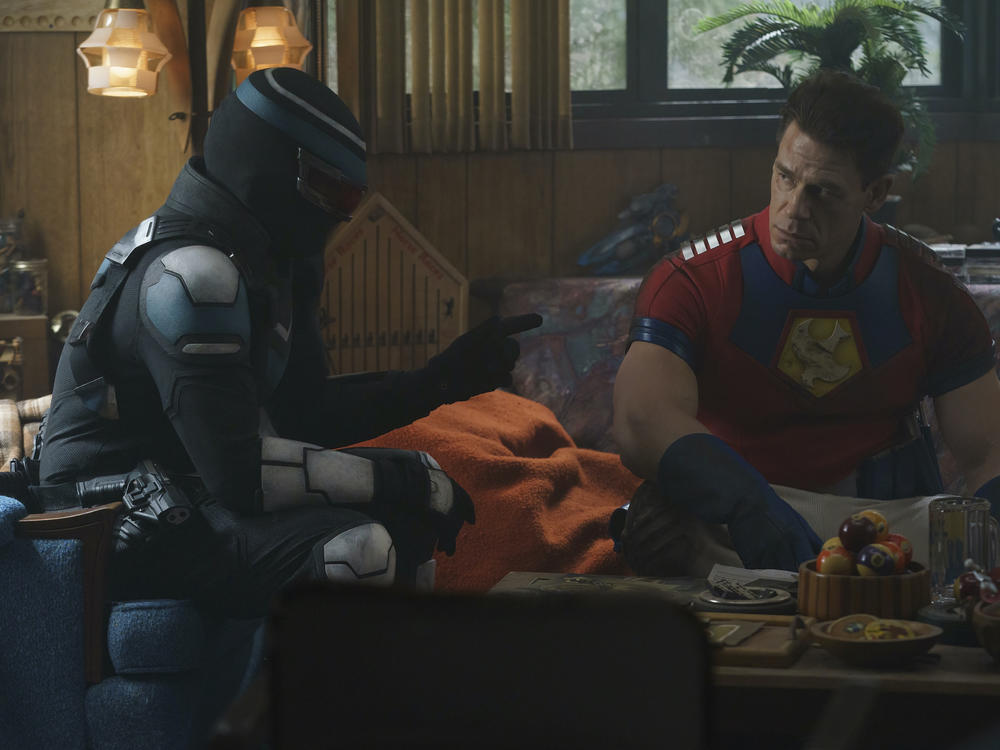Section Branding
Header Content
'Peacemaker' takes aim at a broad, stationary target — with machine guns
Primary Content
There are a lot of jokes in the new HBO Max series Peacemaker, a spinoff of last year's The Suicide Squad. Let's say that much for it.
The problem — and it turns out to be a big, insurmountable one — is that they all take precisely the same form:
CHARACTER A: [Says something.]
CHARACTER B: Wait ... what? [Repeats what Character A just said.]? Seriously? How would that even work?
CHARACTER A: [Attempts to defend what was just said.]
CHARACTER B: You realize [points out the absurdity of what Character A said.]
CHARACTER C [to Character A]: Seriously. Not cool, bro.
CHARACTER A: Look, never mind!
This is the humor of de-escalation, of deconstruction. It's often used to call attention to certain genre elements — in this case, those of the superhero genre — that have calcified into cliche. It serves to explode those cliches and expose them to the harsh light of day, causing us to see them, and the unquestioned assumptions that have formed around them, with fresh eyes.
It's a writer's way of winking at their audience, to clue us in that yes, they know how silly all of this is, too. It doesn't break the fourth wall completely, but it does take a serious chunk out of it.
Used with restraint, jokes like that one can add depth and richness. It's one of the main reasons the first Guardians of the Galaxy movie, directed and co-written by James Gunn, seemed as fresh as it did back in 2014.
.... Eight years ago.
Gunn has written all of, and directed most of, these Peacemaker episodes. In the series, John Cena's bulbously muscled, uber-violent fascist get recruited by a black-ops team to deal with a mysterious threat. The team consists of no-nonsense, hypercompetent Harcourt (Jennifer Holland), sullen tech guy Economos (Steve Agee), reluctant newcomer Adebayo (Danielle Brooks) and stern team lead Murn (Chukwudi Iwuji). Also in the mix: Freddie Stroma's idiotic, would-be sidekick Vigilante, and Robert Patrick, as Peacemaker's white-supremacist dad.
In between missions, which tend to end violently and graphically, in sloppy bursts of brain matter and furious jets of arterial spray, the characters argue.
A lot.
On paper? Sure, makes sense — you delineate characters by placing them in conflict.
As executed here, however? When every argument takes the form outlined above? The same bit, over and over and over? It grows quickly dull, then speeds headlong into annoying — punishingly so.
Given so much incessant and repetitive bickering, it all might still have been salvageable, had the actors been directed to vary their performances — to attack that one, same joke from different angles, using every tool of their craft to find the humor in new and surprising ways, each time.
Instead, they seem to have been instructed to lunge at every juvenile half-joke, every gleefully dirty sort-of-punchline. What should play as rapid-fire banter instead comes off sweaty, lugubrious and — worst of all — telegraphed. No dialogue in Peacemaker is tossed off or thrown away. The tone never varies from that of an airhorn blared at a constant, even, ear-splitting volume.
It's not that Cena, for his part, isn't perfectly game. He's only too happy to hurl himself into the role — and hurl himself around the set, into chairs, major appliances and out windows while he's at it. Mere gameness isn't the issue. It's that Gunn has given himself and his actors more room to play than he's ever been allotted — eight hours' worth — and hasn't figured out how to fill it with anything but the same labored joke, again and again and again.
All that said, Peacemaker does feature one joke you won't, you cannot possibly, tire of. It's the opening credits, which feature the actors, in costume, performing a hilariously stiff choreographed routine to the glam-metal anthem, "Do You Wanna Taste It."
It's everything the series that follows it could, and should, have been — goofy, surprising, hugely appealing and impossible to fast-forward through.
Alas.
Copyright 2022 NPR. To see more, visit https://www.npr.org.

